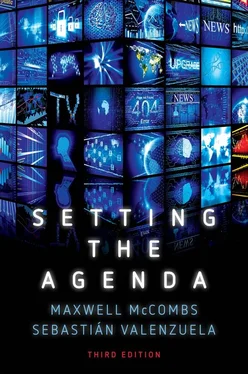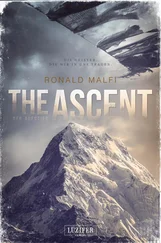In contrast to the piecemeal historical evolution of our knowledge about agenda setting since the seminal 1968 Chapel Hill study, the chapters of this book strive for an orderly and systematic presentation of what we have learned over those years, an attempt to integrate the vast diversity of this evidence – diverse in its historical and geographical settings, mix of media and topics, and research methods. Presenting this integrated picture – in the words of John Pavlik, a Gray’s Anatomy of agenda-setting theory 7– is the central purpose of the book. Much of the evidence forming this picture is from an American setting because the ‘founding fathers’ of agenda setting, Donald Shaw, David Weaver, 8and myself, are American academics, and the majority of the empirical research until recently has been conducted in the United States. However, the reader will encounter considerable evidence from Western Europe, East Asia, Latin America, and the Middle East. One of the great strengths of agenda-setting theory is this geographical and cultural diversity in the evidence replicating the major aspects of this influence on society.
Beyond the immense gratitude to my best friends and long-time research partners, Donald Shaw and David Weaver, this book owes a great debt to the host of scholars worldwide who created the accumulated literature that is catalogued here. Prominent among these scholars is a leading Latin American scholar, Sebastián Valenzuela, who joins me as the co-author of this third edition. An associate professor in the School of Communications at Pontificia Universidad Católica de Chile in Santiago, Sebastián brings an important international voice to Setting the Agenda. He continues the significant contributions to agenda setting made by University of Texas at Austin scholars over the past three decades.
The theory of agenda setting is a complex intellectual map still in the process of evolving. Although the emphasis in this book is on an empirically grounded media-centric map of what we now know about the role of the media in the formation of public opinion, there also is discussion in the later chapters of the larger context in which this media influence occurs. This agenda-setting role of the media has been a rich lode for scholars to mine for more than fifty years, and yet much of its wealth remains untapped. However, even the existing theoretical map already identifies exciting new areas to explore, and the flux in our contemporary public communication system has created a plethora of new opportunities for elaborating the map presented here.
Even within the original domain of public opinion, there is more to consider than just the descriptions and explanations of how the media influence our views of public affairs. For journalists this phenomenon that we now talk about as the agenda-setting role of the news media is an awesome, overarching ethical question about what agenda the media are advancing. ‘What the public needs to know’ is a recurring phrase in the rhetorical repertoire of professional journalism. Does the media agenda really represent what the public needs to know? 9In a moment of doubt, the executive producer of ABC News’ Nightline once asked: ‘Who are we to think we should set an agenda for the nation? What made us any smarter than the next guy?’ 10To a considerable degree, journalism is grounded in the tradition of storytelling. However, good journalism is more than just telling a good story. It is about telling stories that contain significant civic utility. 11The agenda-setting role of the media links journalism and its tradition of storytelling to the arena of public opinion, a relationship with considerable consequences for society. And the expanding media landscape and evolution of journalism and political communication presents significant questions about the formation of public opinion.
Maxwell McCombs
Austin, Texas, March 2020
1 Alan Cowell, ‘New owner struggles at a London tabloid’, New York Times, 26 February 2001, p. C15. 2 Max Frankel, The Times of My Life and My Life with The Times (New York: Random House, 1999), pp. 414–15. 3 Theodore White, The Making of the President, 1972 (New York: Bantam, 1973), p. 327. 4 Maxwell McCombs and Donald Shaw, ‘The agenda-setting function of mass media’, Public Opinion Quarterly, 36 (1972): 176–87. The early history of this study offers a salutary note about new theoretical perspectives. A few months after the 1968 election, McCombs and Shaw submitted the paper later published in Public Opinion Quarterly to the annual convention of the Association for Education in Journalism. Their paper was summarily rejected, which explains the four-year gap between the election and the 1972 article. 5 Contrary to a published statement that the phrase ‘agenda setting’ was suggested by an anonymous reviewer of the original article published in the summer 1972 issue of Public Opinion Quarterly, Part I of the McCombs and Shaw report to the National Association of Broadcasters in June 1969 was titled ‘The agenda-setting function of the mass media’. The title of the full report was ‘Acquiring Political Information’. A revised version of this draft report was not submitted to Public Opinion Quarterly until several years later. The full statement about the phrase ‘agenda setting’ originating with an anonymous reviewer is in Robert L. Stevenson, Rainer Böhme, and Nico Nikel, ‘The TV agenda-setting influence on campaign 2000’, Egyptian Journal of Public Opinion Research, 2, 1 (2001), p. 29. 6 Maxwell McCombs and Jian-Hua Zhu, ‘Capacity, diversity, and volatility of the public agenda: trends from 1954 to 1994’, Public Opinion Quarterly, 59 (1995): 495–525; Jill A. Edy and Patrick C. Meirick, ‘The fragmenting public agenda: capacity, diversity, and volatility in responses to the “most important problem” question’, Public Opinion Quarterly, 82 (2018): 661–85. 7 My thanks to John Pavlik for this metaphoric comparison, made during a conversation about the first edition of this book on 12 September 2003 in Bonn, Germany. 8 David Weaver, who came to the University of North Carolina to study for his PhD shortly after the original Chapel Hill study, quickly gained a major role in the development of agenda-setting theory. His contribution as a graduate student during the 1972 US presidential election is detailed in Chapter 6 and as a faculty member at Indiana University during the 1976 US presidential election in Chapter 1. Many other contributions from Indiana University in the subsequent years are noted in other chapters, along with continuing contributions from the University of North Carolina at Chapel Hill. 9 Michael Gurevitch and Jay Blumler, ‘Political communication systems and democratic values’, in Democracy and the Mass Media, ed. Judith Lichtenberg (Cambridge: Cambridge University Press, 1990), pp. 269–89.10 Tom Bettag, ‘What’s news? Evolving definitions of news’, Harvard International Journal of Press/Politics, 5, 3 (2000): 105.11 Davis Merritt and Maxwell McCombs, The Two W’s of Journalism: The Why and What of Public Affairs Reporting (Mahwah, NJ: Lawrence Erlbaum, 2003).
1 Influencing Public Opinion
The American humourist Will Rogers was fond of prefacing his sardonic political observations with the comment, ‘All I know is just what I read in the newspapers.’ This comment is a succinct summary about most of the knowledge and information that each of us possesses about public affairs, because most of the issues and concerns that engage our attention are not amenable to direct personal experience. As Walter Lippmann long ago noted in Public Opinion , ‘The world that we have to deal with politically is out of reach, out of sight, out of mind.’ 1In Will Rogers’ and Walter Lippmann’s day, the daily newspaper was the principal source of information about public affairs. Today we have a vastly expanded panoply of communication channels, but the central point is the same. For nearly all of the concerns on the public agenda, citizens deal with a second-hand reality, a reality that is structured by journalists’ reports about these events and situations, which in turn are amplified, transformed, and commented upon by users across digital and mobile media.
Читать дальше












